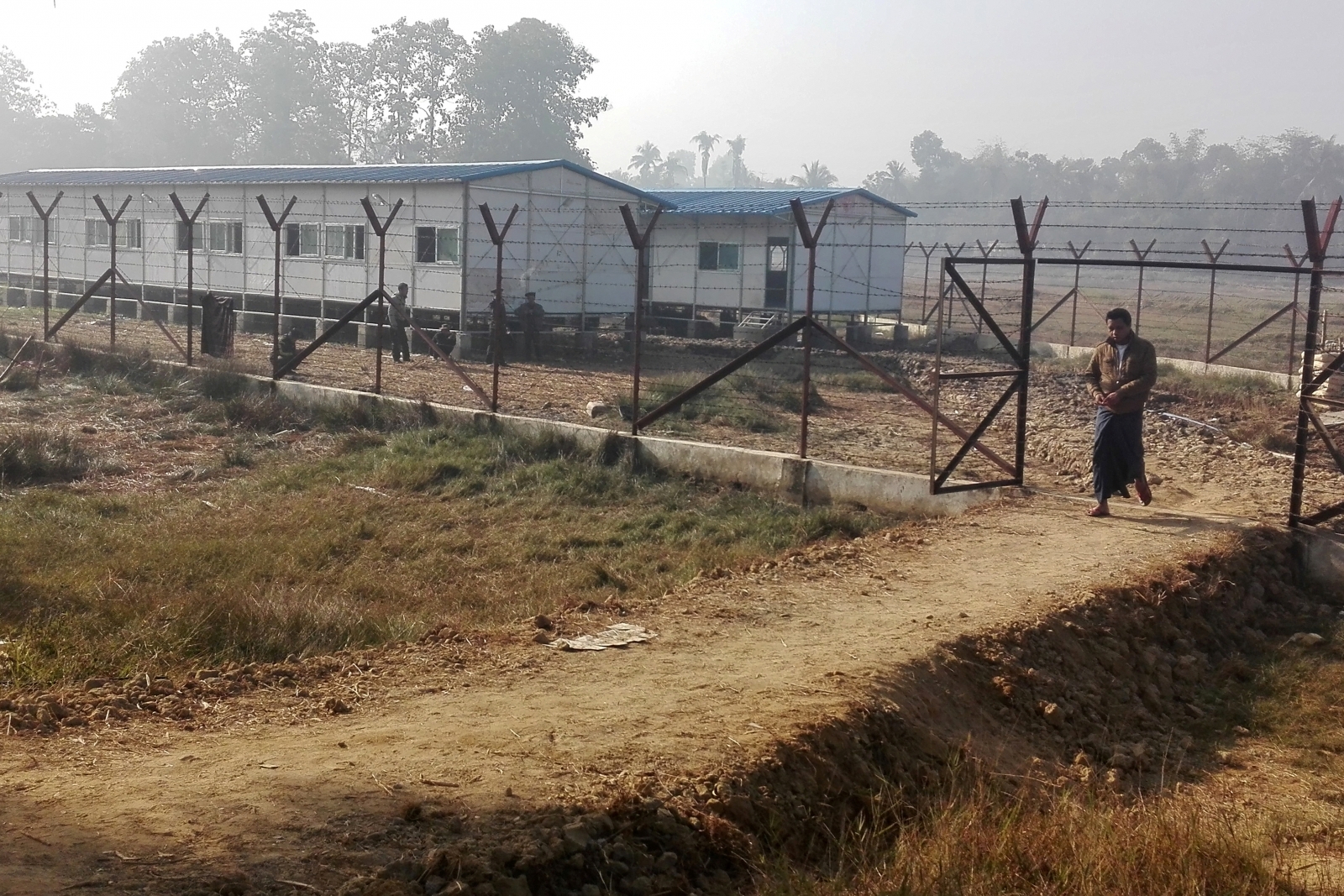Barbed wire fences and armed guards: First photos of Myanmar's Rohingya reception camps
Workers are building long, plywood houses on a rocky field, surrounded by a fence topped with barbed wire and guarded by armed soldiers.
Myanmar finally allowed the world's media in to Rakhine state to show they are ready to welcome back some of the hundreds of thousands of Rohingya Muslims who fled the country. The photos don't look too promising.
The main parallel between #Myanmar camps for #Rohingyas and the #Nazi camps I have visited including #Auschwitz: they are NOT designed to sustain or nurture life as we know it. @nslwin @khinmai @tunkhin80 @YangheeLeeSKKU @the_erc @tunkhin80 @kcroninfurman @CoconutsYangon pic.twitter.com/5f2Ok3uUV9
— maung zarni (@drzarni) January 24, 2018
Journalists and an international delegation advising Myanmar toured the Taung Pyo Letwe camp being set up outside the town of Maungdaw near the Bangladesh border. Workers were seen building long, plywood houses set on a rocky field and surrounded by a fence topped with barbed wire and guarded by armed soldiers.



There was no sign of any of the nearly 700,000 Rohingya chased away by Myanmar security forces. The refugees are deeply skeptical, if not outright terrified, about returning to a place where they say their homes were burned, their wives, sisters and mothers raped, and their friends, relatives and neighbours killed.
The United Nations and the United States have described the crackdown as "ethnic cleansing." The UN human rights chief has also suggested that it may be genocide.
In the sprawling camps in Bangladesh, many Rohingya say they'll only to return to Myanmar if there's strong outside monitoring of their safety and living conditions. "How can we go back to Myanmar without anyone guaranteeing our security," said Alam, a Rohingya in the Bulakhali refugee camp. "If we would be given homes in our villages that were burned, then we would go back."
"Myanmar is just getting ready by itself, but we are not going unless there are promises made for us," Ko Ko Lin, a member of Arakan Rohingya National Organisation, told the Associated Press.
Bangladesh and Myanmar agreed to a two-year repatriation process that was set to begin on Tuesday (23 January). But the day before the supposed repatriation was due to begin, officials in Bangladesh said a number of issues remained unresolved, in particular worries that refugees were being forced to return.
Win Myat Aye, Myanmar's social welfare minister, said Myanmar has provided Bangladesh with a list of 700 Rohingya and 400 Hindu refugees who have been verified as eligible for repatriation. Only refugees with identity documents – which most Rohingya lack – will be allowed back into Myanmar.
Myanmar Union Minister Thaung Tun told reporters that his country is currently prepared to receive 300 returnees a day and "the number could increase based on the progress of the first batch that will be coming across."
A total of more than one million Rohingya Muslims – refugees from several waves of migration – are living in refugee camps in Bangladesh, but international aid workers, local officials and the refugees themselves say preparations for repatriation are far from complete.





The United Nations has called on Myanmar to give aid agencies unhindered access to the camps it has built for tens of thousands of Muslim Rohingya refugees. The UN said necessary safeguards for the refugees were still missing.
"Until the safety and wellbeing of any child returning to Myanmar can be guaranteed, talk of repatriation is premature," Unicef Deputy Executive Director Justin Forsyth said in a statement. The UN Refugee Agency UNHCR said "there are continued restrictions on access for aid agencies, the media and other independent observers" in Myanmar.
The UNHCR called on Myanmar "to allow the necessary unhindered humanitarian access in Rakhine State and create conditions for a genuine and lasting solution".
Caroline Gluck, UNHCR's senior public information officer in Cox's Bazar, told Reuters: "We would like to be part of the process and discussions to ensure the reparations are voluntary, safe and sustainable and that any returns are in line with international standards."
Many in Myanmar see Rohingya as illegal migrants from Bangladesh, although many families have lived in Myanmar for generations. They have been denied citizenship, freedom of movement and other basic rights.
According to the UN refugee agency and other rights groups, Rohingya are still fleeing across the border into Bangladesh, although the numbers are smaller than in previous months.






















